Nick Young in Psyche:
 As you read this article, time will seem to pass. Right now, you are reading these words, but now you are reading these ones. What was present just an instant ago seems to have already slipped into the past. You will carry this feeling with you – as objects change and move, as thoughts run through your head, as feelings ebb and flow – until you fall asleep tonight. Heraclitus thought that time was like a river: ‘Everything flows and nothing abides; everything gives way and nothing stays fixed.’ Our experience of the world seems to back this up. It certainly feels as if time is sweeping us along. Yet, physicists and philosophers will tell you that Heraclitus was wrong. Time, they say, does not actually pass. In his book The Order of Time (2018), the Italian theoretical physicist Carlo Rovelli writes:
As you read this article, time will seem to pass. Right now, you are reading these words, but now you are reading these ones. What was present just an instant ago seems to have already slipped into the past. You will carry this feeling with you – as objects change and move, as thoughts run through your head, as feelings ebb and flow – until you fall asleep tonight. Heraclitus thought that time was like a river: ‘Everything flows and nothing abides; everything gives way and nothing stays fixed.’ Our experience of the world seems to back this up. It certainly feels as if time is sweeping us along. Yet, physicists and philosophers will tell you that Heraclitus was wrong. Time, they say, does not actually pass. In his book The Order of Time (2018), the Italian theoretical physicist Carlo Rovelli writes:
What could be more universal and obvious than this flowing?
And yet things are somewhat more complicated than this. Reality is often very different from what it seems. The Earth appears to be flat but is in fact spherical. The Sun seems to revolve in the sky when it is really we who are spinning. Neither is the structure of time what it seems to be: it is different from this uniform, universal flowing.
So, what is the real structure of time? Well, it’s complicated.
More here.

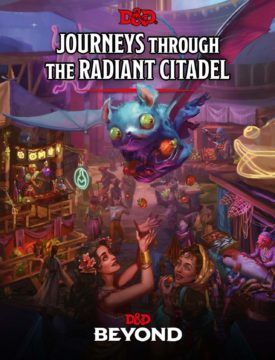 David M. Higgins talks to Ajit George in LA Review of Books:
David M. Higgins talks to Ajit George in LA Review of Books: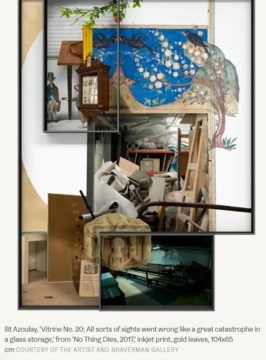 Marco Roth in Tablet:
Marco Roth in Tablet: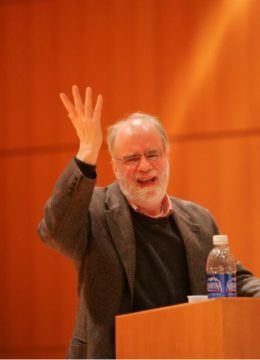 Sam Roberts in the New York Times:
Sam Roberts in the New York Times: There is a secret. And that secret is how to make top-secret secrets not secret anymore using only your mind. All that stands between you and doing this is embracing the power of positive declassifying. Let others submit formal written declassification requests to the proper agencies. You are special. You are powerful. You are going to jail. The first step is gratitude. Close your eyes—but also maybe keep one open for the F.B.I.—and say meaningful thank-yous to those whose service you will be betraying.
There is a secret. And that secret is how to make top-secret secrets not secret anymore using only your mind. All that stands between you and doing this is embracing the power of positive declassifying. Let others submit formal written declassification requests to the proper agencies. You are special. You are powerful. You are going to jail. The first step is gratitude. Close your eyes—but also maybe keep one open for the F.B.I.—and say meaningful thank-yous to those whose service you will be betraying. I measure every Grief I meet
With narrow, probing, eyes –
I wonder if It weighs like Mine –
Or has an Easier size.
I wonder if They bore it long –
Or did it just begin –
I could not tell the Date of Mine –
It feels so old a pain –
I wonder if it hurts to live –
And if They have to try –
And whether – could They choose between –
It would not be – to die –
More
I measure every Grief I meet
With narrow, probing, eyes –
I wonder if It weighs like Mine –
Or has an Easier size.
I wonder if They bore it long –
Or did it just begin –
I could not tell the Date of Mine –
It feels so old a pain –
I wonder if it hurts to live –
And if They have to try –
And whether – could They choose between –
It would not be – to die –
More 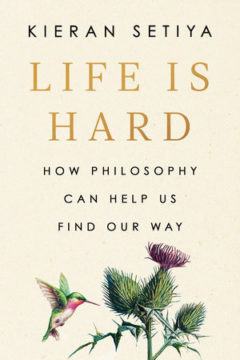 Philosophy’s role here is not primarily analytical. We cannot be argued into coping with suffering. Instead, Setiya’s book is guided by an insight from Iris Murdoch: that philosophical progress often consists of finding new and better ways to describe some stretch of our experience. This kind of progress is not won by logic. It requires careful attention, precise thinking and the ability to draw distinctions that cast light on that which is of value. Setiya is at his best when he has something or someone clearly in view – for example in his account of living with chronic pain, or his discussion of the philosopher and mystic Simone Weil.
Philosophy’s role here is not primarily analytical. We cannot be argued into coping with suffering. Instead, Setiya’s book is guided by an insight from Iris Murdoch: that philosophical progress often consists of finding new and better ways to describe some stretch of our experience. This kind of progress is not won by logic. It requires careful attention, precise thinking and the ability to draw distinctions that cast light on that which is of value. Setiya is at his best when he has something or someone clearly in view – for example in his account of living with chronic pain, or his discussion of the philosopher and mystic Simone Weil.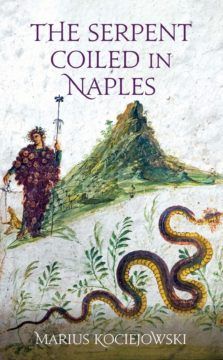 One day a few years ago, an Englishman walked into a tourist shop on the ground floor of a Neapolitan palazzo and told a woman he encountered there that he was searching for the soul of Naples. The building, named Palazzo del Panormita, for an obscure fifteenth-century author of erotic Latin epigrams, stands near a small piazza named for the River Nile, recalling the Egyptian traders who once lived in a mini-quarter within the city center’s ancient Greek grid. (There was a Greek settlement there before the Parthenon was built.) Today, that grid runs into a thoroughfare cut by the Spanish in the sixteenth century, when the Kingdom of Naples was under their imperial control. Named Via Toledo by the Spanish, the street became Via Roma three centuries later, when Naples, at last free of a series of foreign overlords, joined a unified Italy. And yet for many Neapolitans the idea of being governed from Rome was apparently as abhorrent as Spanish dominion: the name Via Roma aroused so much resentment that, in the nineteen-eighties, the city brought the old Spanish name back into official use. Even now, Neapolitans differ sharply on what their central commercial street should be called.
One day a few years ago, an Englishman walked into a tourist shop on the ground floor of a Neapolitan palazzo and told a woman he encountered there that he was searching for the soul of Naples. The building, named Palazzo del Panormita, for an obscure fifteenth-century author of erotic Latin epigrams, stands near a small piazza named for the River Nile, recalling the Egyptian traders who once lived in a mini-quarter within the city center’s ancient Greek grid. (There was a Greek settlement there before the Parthenon was built.) Today, that grid runs into a thoroughfare cut by the Spanish in the sixteenth century, when the Kingdom of Naples was under their imperial control. Named Via Toledo by the Spanish, the street became Via Roma three centuries later, when Naples, at last free of a series of foreign overlords, joined a unified Italy. And yet for many Neapolitans the idea of being governed from Rome was apparently as abhorrent as Spanish dominion: the name Via Roma aroused so much resentment that, in the nineteen-eighties, the city brought the old Spanish name back into official use. Even now, Neapolitans differ sharply on what their central commercial street should be called.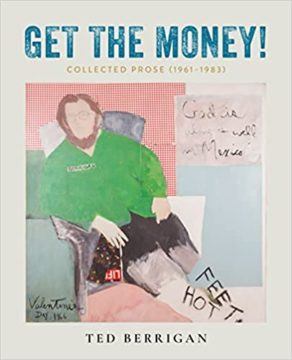 Though there is less of Berrigan’s prose than his poetry, the best of it—his early journals, the collaged “interview” with
Though there is less of Berrigan’s prose than his poetry, the best of it—his early journals, the collaged “interview” with  Over the course of his 36-year career, the photographer
Over the course of his 36-year career, the photographer  In October 2021, Meta Platforms, Inc, released a “trailer”, hosted by the company’s CEO Mark Zuckerberg, to give a visual tour of its recent expansion into the Metaverse – the immersive, virtual-reality world that is expected to be the next great iteration of our internet technologies.
In October 2021, Meta Platforms, Inc, released a “trailer”, hosted by the company’s CEO Mark Zuckerberg, to give a visual tour of its recent expansion into the Metaverse – the immersive, virtual-reality world that is expected to be the next great iteration of our internet technologies.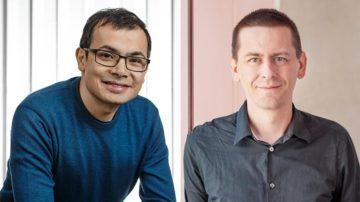 The researchers behind the AlphaFold artificial-intelligence (AI) system have won one of this year’s US$3-million Breakthrough prizes — the most lucrative awards in science. Demis Hassabis and John Jumper, both at DeepMind in London, were recognized for creating the tool that has predicted the 3D structures of almost every known protein on the planet.
The researchers behind the AlphaFold artificial-intelligence (AI) system have won one of this year’s US$3-million Breakthrough prizes — the most lucrative awards in science. Demis Hassabis and John Jumper, both at DeepMind in London, were recognized for creating the tool that has predicted the 3D structures of almost every known protein on the planet. Switching from fossil fuels to renewable energy could save the world as much as $12tn (£10.2tn) by 2050, an Oxford University study says.
Switching from fossil fuels to renewable energy could save the world as much as $12tn (£10.2tn) by 2050, an Oxford University study says. “She has her mother’s eyes,” begins the advertisement, “but will she also inherit her breast cancer diagnosis?” The smooth voice in the video is promoting the services of Genomic Prediction, a US company that says it can help prospective parents to answer this question by testing the genetics of embryos during fertility treatment. For Nathan Treff, the company’s chief scientific officer, this mission is personal. At 24, he was diagnosed with type 1 diabetes — a disease that cost his grandfather his leg. If Treff had it his way, no child would be born with a high risk for the condition.
“She has her mother’s eyes,” begins the advertisement, “but will she also inherit her breast cancer diagnosis?” The smooth voice in the video is promoting the services of Genomic Prediction, a US company that says it can help prospective parents to answer this question by testing the genetics of embryos during fertility treatment. For Nathan Treff, the company’s chief scientific officer, this mission is personal. At 24, he was diagnosed with type 1 diabetes — a disease that cost his grandfather his leg. If Treff had it his way, no child would be born with a high risk for the condition.